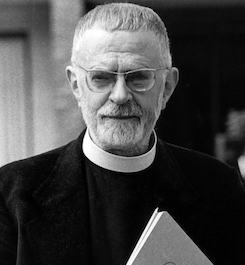Louis Bouyer
- JOHN JANARO
The influential and prolific French Catholic, Father Louis Bouyer (1913-2004) — was born into a Protestant family on the eve of World War I, and was briefly a Lutheran minister.
 But Christ drew him to the fullness of the Catholic faith through both personal circumstances and the remarkable (though somewhat chaotic) vitality of the ecumenical experience among Christians in Paris between the wars.
But Christ drew him to the fullness of the Catholic faith through both personal circumstances and the remarkable (though somewhat chaotic) vitality of the ecumenical experience among Christians in Paris between the wars.
French Protestants had their own social circles, and Louis Bouyer grew up among them in Paris and the surrounding countryside. His mother's death occasioned temptations to skepticism, but his attraction to beauty, his Christian companions, and several Protestant pastors led Louis during his adolescent years to a mature conviction of both God's existence and the divinity of Jesus Christ.
After the war, the movement for Christian unity spread widely among Protestants, and his Protestant teachers introduced Louis to the Church Fathers and ancient liturgical traditions. One of them gave Louis a copy of a book by John Henry Newman, and in its pages he found a lifelong mentor, spiritual father, and model for his own journey.
Encouraged by his "High Church" Lutheran parish in Paris, Louis entered the Protestant seminary to study for the ministry. Paris was explosive in brilliance, creativity, and confusion after World War I. There was much decadence, but there was also an impetus for renewal, especially among some prominent Christian intellectuals fighting against the prevailing milieu of reductionist modernism. Louis Bouyer the seminarian and his circle of friends plunged into this ardent search for Christian renewal and reconnection with the perennial sources of Christian faith and spirituality.
Further stimulus in those years came from Russian Orthodox priests and intellectuals who had fled the Communist revolution and settled in Paris. Young Bouyer met some of the great figures of 20th-century Russian Orthodoxy (including Sergei Bulgakov and Vladimir Lossky) and experienced the vivid ancient rituals and stunning beauty of the Russian Orthodox liturgy. By this time, Bouyer had hopes of participating in a movement to bring the "positive elements" of the Protestant Reformation (the emphasis on God's grace, interior life, and biblical piety) into unity with the ancient Christian tradition. He and his friends went so far as to be chrismated, to confess, and to receive the Eucharist from an ex-Catholic priest who had become an Orthodox monk. This initiative, however, went no further.
Bouyer remained Lutheran, and indeed became a Lutheran minister in 1935. But he continued searching. Visits to the Benedictine Abbey of Saint-Wandrille showed him that liturgical traditions centered on Jesus in the Eucharist were not confined to the East, and he was deeply drawn to the abbey's Catholic life. Yet he hesitated, not because of any doctrinal quandaries, but for the most human of reasons: he was in love. In 1938, he proposed marriage to a young woman he had known for a number of years. Her mother's opposition to him, however, strained and ultimately broke the relationship. Heartbroken, Bouyer let go of his dream of being a married clergyman. Then he and his compatriots were shaken out of many other dreams when war against Germany was declared in 1939.
Louis Bouyer was received into the Catholic Church at Saint-Wandrille Abbey on December 27, 1939. Though Bouyer initially aspired to join the Benedictines, the abbot — Dom Lucien Chambat — counseled him instead to join the Oratorians at Juilly, and thus he entered the priestly community of Saint Philip Neri and his own beloved Saint John Henry Newman.
 This is Meaghen Gonzalez, Editor of CERC. I hope you appreciated this piece. We curate these articles especially for believers like you.
This is Meaghen Gonzalez, Editor of CERC. I hope you appreciated this piece. We curate these articles especially for believers like you.
Please show your appreciation by making a $3 donation. CERC is entirely reader supported.

Acknowledgement
 John Janaro. "Louis Bouyer." Magnificat (2021).
John Janaro. "Louis Bouyer." Magnificat (2021).
Reprinted with permission of Magnificat.
The Author

 John Janaro is Associate Professor Emeritus of Theology at Christendom College. He is a Catholic theologian, and a writer, researcher, and lecturer on issues in religion and culture. He is the author of Never Give Up: My Life and God's Mercy and The Created Person and the Mystery of God: The Significance of Religion in Human Life. He is married to Eileen Janaro and has five children.
John Janaro is Associate Professor Emeritus of Theology at Christendom College. He is a Catholic theologian, and a writer, researcher, and lecturer on issues in religion and culture. He is the author of Never Give Up: My Life and God's Mercy and The Created Person and the Mystery of God: The Significance of Religion in Human Life. He is married to Eileen Janaro and has five children.




